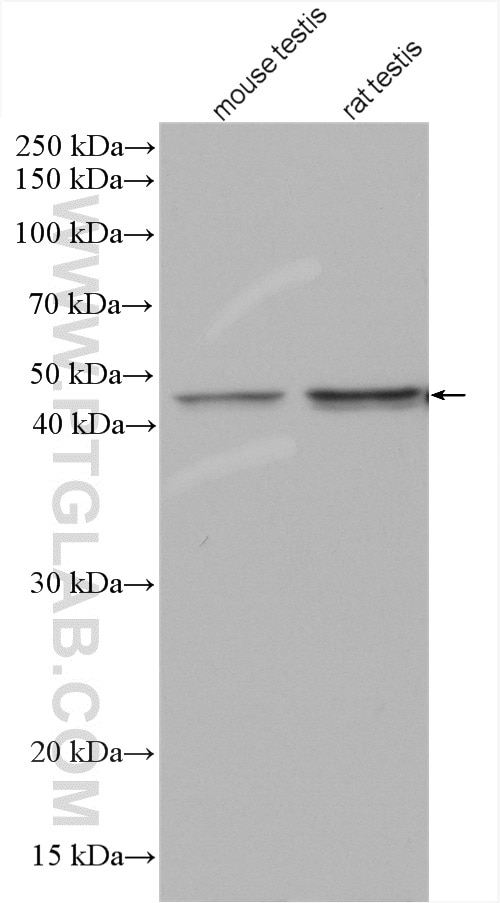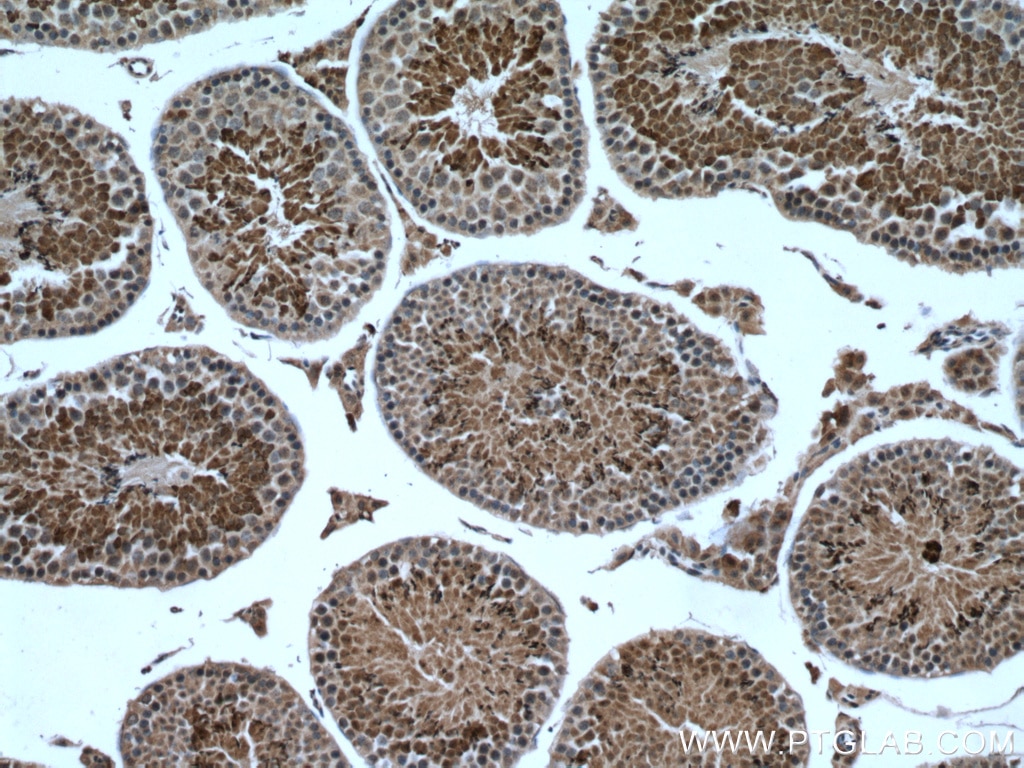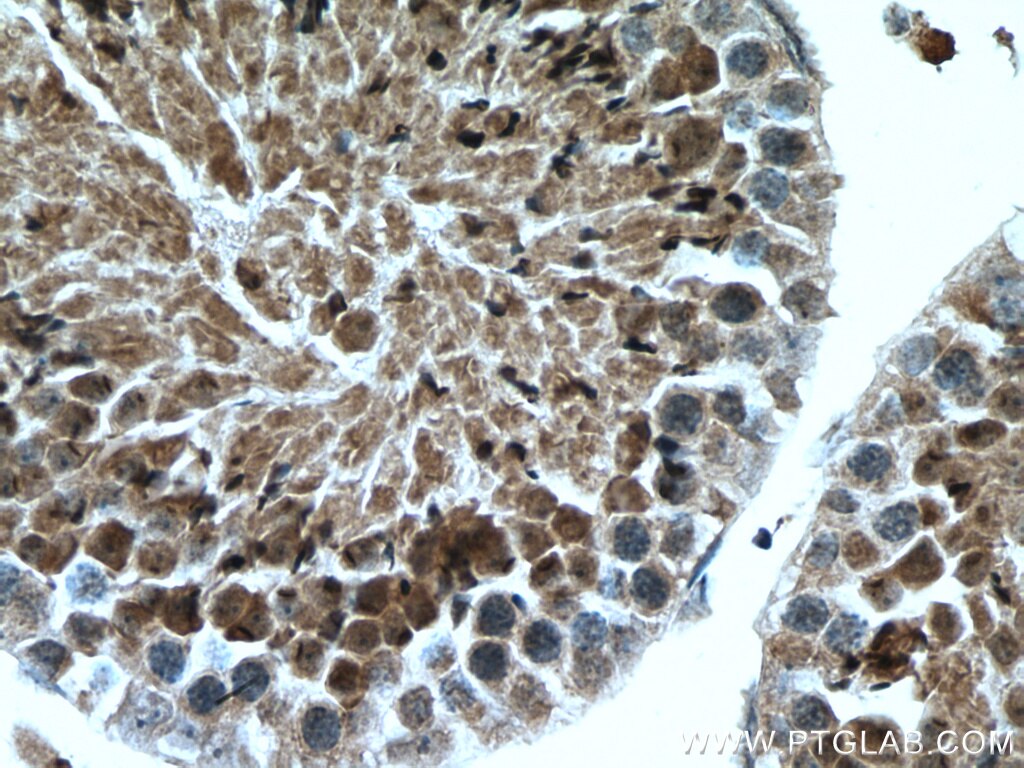ACTL7A Polyklonaler Antikörper
ACTL7A Polyklonal Antikörper für WB, IHC, ELISA
Wirt / Isotyp
Kaninchen / IgG
Getestete Reaktivität
human, Maus, Ratte
Anwendung
WB, IHC, IF, IP, CoIP, ELISA
Konjugation
Unkonjugiert
Kat-Nr. : 17355-1-AP
Synonyme
Geprüfte Anwendungen
| Erfolgreiche Detektion in WB | Maushodengewebe, Rattenhodengewebe |
| Erfolgreiche Detektion in IHC | Maushodengewebe Hinweis: Antigendemaskierung mit TE-Puffer pH 9,0 empfohlen. (*) Wahlweise kann die Antigendemaskierung auch mit Citratpuffer pH 6,0 erfolgen. |
Empfohlene Verdünnung
| Anwendung | Verdünnung |
|---|---|
| Western Blot (WB) | WB : 1:1000-1:5000 |
| Immunhistochemie (IHC) | IHC : 1:50-1:500 |
| It is recommended that this reagent should be titrated in each testing system to obtain optimal results. | |
| Sample-dependent, check data in validation data gallery | |
Veröffentlichte Anwendungen
| WB | See 8 publications below |
| IHC | See 1 publications below |
| IF | See 11 publications below |
| IP | See 2 publications below |
| CoIP | See 3 publications below |
Produktinformation
17355-1-AP bindet in WB, IHC, IF, IP, CoIP, ELISA ACTL7A und zeigt Reaktivität mit human, Maus, Ratten
| Getestete Reaktivität | human, Maus, Ratte |
| In Publikationen genannte Reaktivität | human, Maus |
| Wirt / Isotyp | Kaninchen / IgG |
| Klonalität | Polyklonal |
| Typ | Antikörper |
| Immunogen | ACTL7A fusion protein Ag10613 |
| Vollständiger Name | actin-like 7A |
| Berechnetes Molekulargewicht | 435 aa, 49 kDa |
| Beobachtetes Molekulargewicht | 49 kDa |
| GenBank-Zugangsnummer | BC014610 |
| Gene symbol | ACTL7A |
| Gene ID (NCBI) | 10881 |
| Konjugation | Unkonjugiert |
| Form | Liquid |
| Reinigungsmethode | Antigen-Affinitätsreinigung |
| Lagerungspuffer | PBS with 0.02% sodium azide and 50% glycerol |
| Lagerungsbedingungen | Bei -20°C lagern. Nach dem Versand ein Jahr lang stabil Aliquotieren ist bei -20oC Lagerung nicht notwendig. 20ul Größen enthalten 0,1% BSA. |
Hintergrundinformationen
ACTL7a is located in the acrosome and tail of mature spermatozoa and plays an important role in spermiogenesis. Recently mutation of ACTL7A has been linked to infertility.
Protokolle
| PRODUKTSPEZIFISCHE PROTOKOLLE | |
|---|---|
| WB protocol for ACTL7A antibody 17355-1-AP | Protokoll herunterladen |
| IHC protocol for ACTL7A antibody 17355-1-AP | Protokoll herunterladenl |
| STANDARD-PROTOKOLLE | |
|---|---|
| Klicken Sie hier, um unsere Standardprotokolle anzuzeigen |
Publikationen
| Species | Application | Title |
|---|---|---|
Am J Hum Genet Homozygous pathogenic variants in ACTL9 cause fertilization failure and male infertility in humans and mice. | ||
Hum Reprod ACROSIN deficiency causes total fertilization failure in humans by preventing the sperm from penetrating the zona pellucida | ||
Hum Reprod Deletion of ACTRT1 is associated with male infertility as sperm acrosomal ultrastructural defects and fertilization failure in human | ||
Hum Reprod Loss of SPACA1 function causes autosomal recessive globozoospermia by damaging the acrosome-acroplaxome complex. | ||
Hum Reprod Novel bi-allelic variants in ACTL7A are associated with male infertility and total fertilization failure. | ||
Development Loss of perinuclear theca ACTRT1 causes acrosome detachment and severe male subfertility in mice. |




